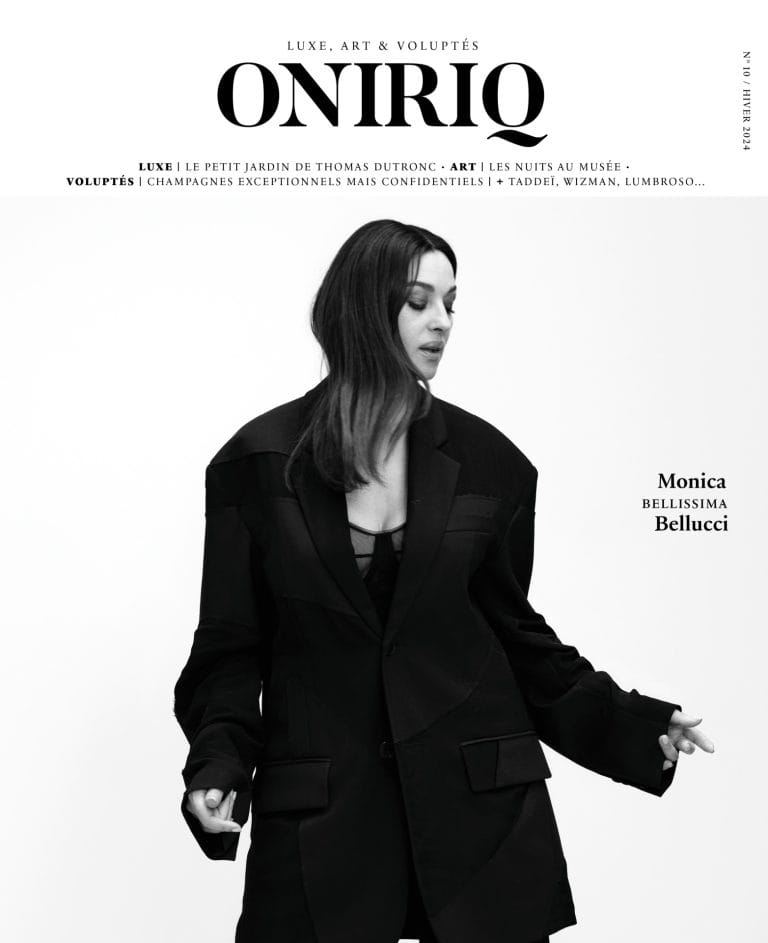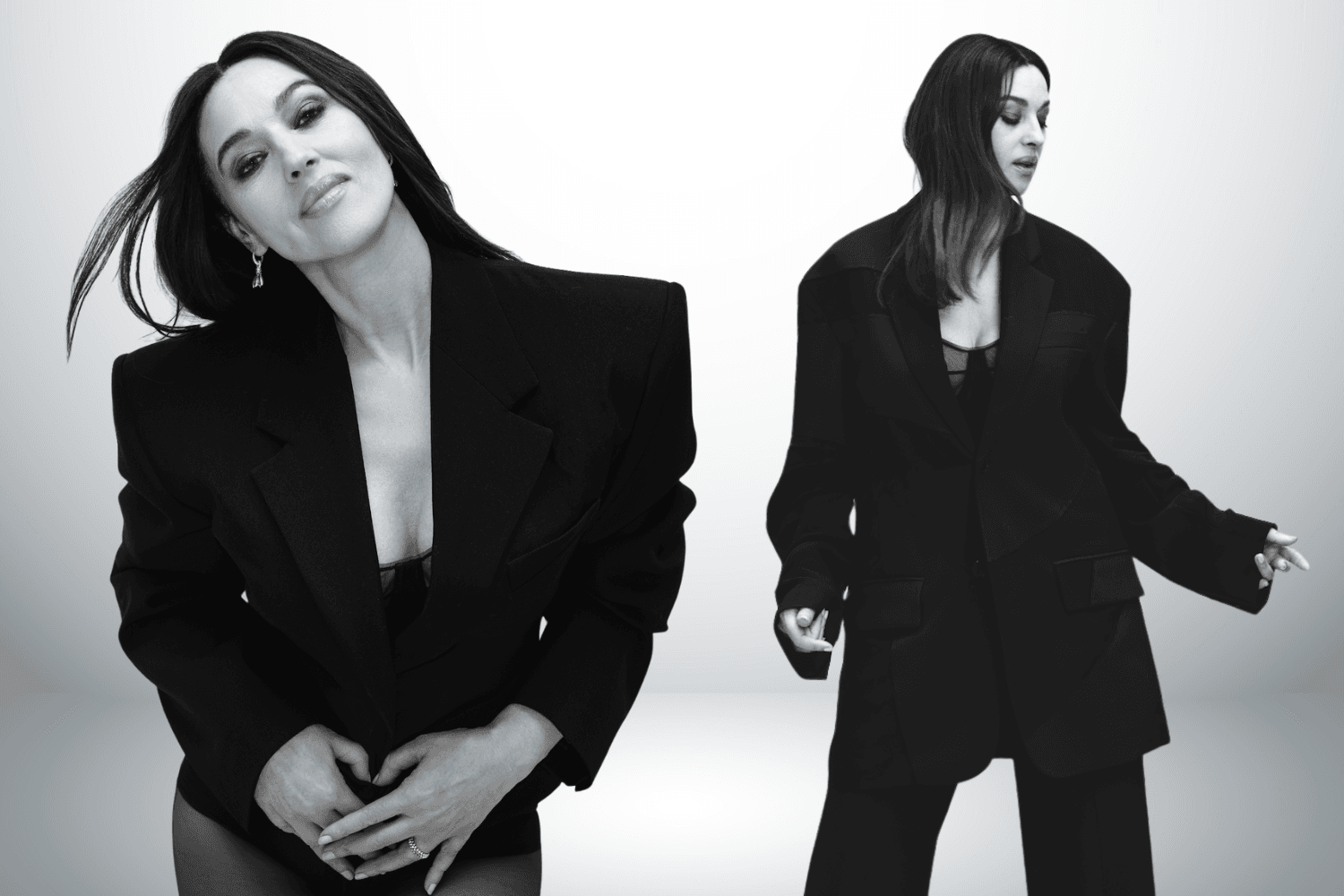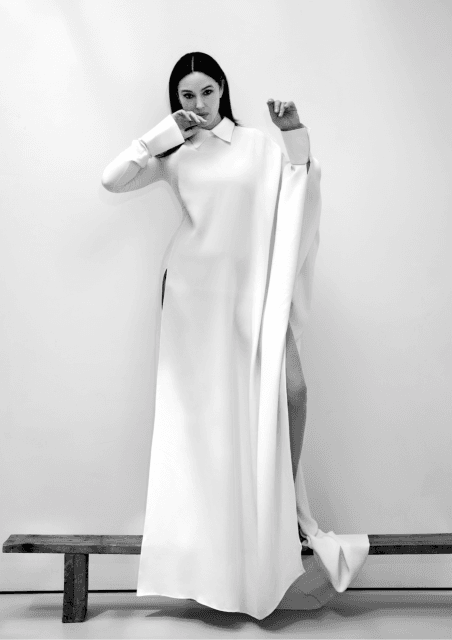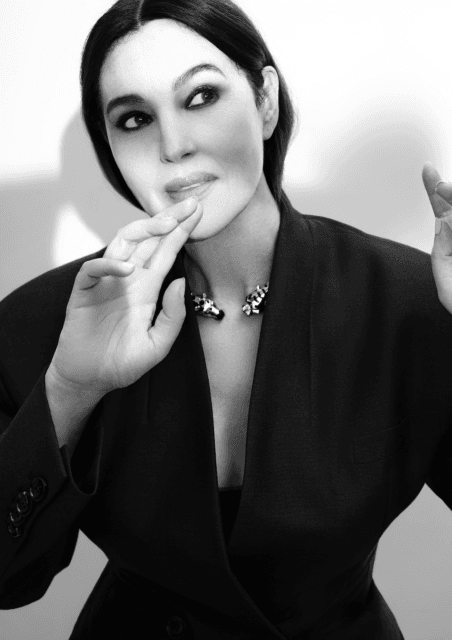Translated by Bethszabee Garner
At 60, Monica Bellucci frees herself from the dictates of an environment that is often stingy with roles for women her age, preferring instinct to habit, grace to compromise. Under the camera of Yannis Dimolitsas and Tom Wolf, she embodies the fragile balance between greatness and flaws. Between passion, serenity and the quest for authenticity, she shares a touching reflection on her journey, her inspirations, and the challenges of an international career where the fire of creation never goes out.
Désirée De Lamarzelle: Your documentary on Maria Callas comes from your stage tour, Maria Callas, letters & memories, where you explored the intimacy of this icon. How did you live this very personal experience?
Monica Bellucci: The theatre offers a raw and sincere reality, different from what you can experience in cinema. For me, it was a unique experience, because I had never done theatre before. With Maria Callas, something profound was awakened. The documentary by Yannis Dimolitsas and Tom Volf, titled Maria Callas, Monica Bellucci: an Encounter, is aptly named, because it was a real encounter, between her and me. She also inspired generations of artists, like Angelina Jolie, Marina Abramovic or Fanny Ardant. Maria Callas was not simply an immense soprano, but also an incredibly modern actress. A woman with the heart on fire, who devoted all her passion and her soul to her art. She became a glamorous and demanding icon, all the while staying deeply authentic. This inner fire continues to touch us and move us today.
Désirée De Lamarzelle: Living in the shoes of Maria Callas must have been almost exhausting?
Monica Bellucci: Yes, but she was driven by an immense passion and a great freedom. She dared to divorce at a time where it was illegal in Italy, always living her emotions to the fullest. She said that her greatest sadness was not her relationship with Onassis, but of not having children. Her family life, marked by difficult relationships with her mother and sister, forged her complexity and modernity. Courageous, she fought for her choices, her emotions and her freedom. She wanted to be independent at a time when women still lived in a very domestic reality. She is an inspiration for a lot of women, in all fields.

Creme long dress, Valentino
Désirée De Lamarzelle: Was she already a model?
Monica Bellucci: Absolutely. She is one of those women who started to make things happen. What is fascinating, is that beyond the artist, there was a woman, with her strength and fragility.
Désirée De Lamarzelle: How did you explore the duality of Maria Callas, between her public image and her private life?
Monica Bellucci: In this profession, the image that one projects serves as protection, but it is never the reality. It is an indispensable barrier to preserve one’s privacy and way of life. The real danger comes when the image and the artist merge: everything becomes terribly complex. I find this artist to be fascinating: perceived as tough and demanding, this play nevertheless reveals a vulnerable woman, of a rare sensibility. On one hand, she inspired respect and curiosity, on the other, a women remained hidden behind the artist. This documentary also illustrates the work of an actress necessary to embody this figure, the connection with the public and the emotions transmitted in every detail.
Désirée De Lamarzelle: At 60, you continue to embody varied and striking roles. But what can we say of a film industry that too rarely offers such opportunities to actresses after 50?
Monica Bellucci: I am lucky to continue to collaborate with varied directors and even to explore sensual roles, like in Beetlejuice or the series Ça, c’est Paris ! by Marc Fitoussi. Of course, this remains linked to opportunities that we receive and that are far too lacking, even if things are evolving positively. Fortunately, in France, actresses over 60 like Catherine Deneuve, Isabelle Huppert or Fanny Ardent continue to shine in magnificent roles, which must serve as a source of inspiration for cinema.
Désirée De Lamarzelle: Is it more frequent here than elsewhere?
Monica Bellucci: Yes, France benefits from a great deal of vitality in the film industry. Thanks to the system of subsidies and support, spontaneity and the creation of many films remain possible, which is not the case everywhere. My career journey, for its part, is a bit unusual. I work in several countries, which gives me a certain amount of freedom and a multicultural perspective. I go where interesting projects present themselves, and this has allowed me to build, in a way, an international career.
Désirée De Lamarzelle: It is often said that you are the most French of Italians. How did this dual identity enrich your life and career?
Monica Bellucci: I simply followed the opportunities and my desires. This atypical path build itself like that, naturally. I live in Paris, but I remain very connected to Italy.
Désirée De Lamarzelle: When i ask ChatGPT the question what artwork to associate you with, it answers: “Psych revived by Cupid’s kiss by Canova for their raw emotion and their timeless beauty”
Monica Bellucci: Ah, but that’s too flattering! (Laughs)
Désirée De Lamarzelle: It is artificial intelligence talking! What artwork moves you the most?
Monica Bellucci: I love Chagall. His art exudes joy and love, while reflecting a depth linked to his life. When the woman he loved died, he stopped painting for a while, as if his art suffered with him. I find that in his works, even when a touch of darkness appears, it is always the light that ends up triumphing.

GUCCI Coat/CARTIER Necklace
Désirée De Lamarzelle: The Maria Callas tour was your first experience on stage. Are there more unexploited areas that you would love to explore?
Monica Bellucci: What I love about my work, is the surprise. When a director offers me a project that I would have never thought about, it inspires me. As an actress, I need this excitement, these vibrations that move me or scares me a little. Sometimes, i am offered great roles, but if I have already explored this territory, I cannot return to it. My soul has already given. However, when a new project arrives, that deeply touches me, I throw myself into it with passion.
Désirée De Lamarzelle: You recently collaborated with Tim Burton in Beetlejuice. Did he influence your vision of cinema?
Monica Bellucci: Every film is a unique, almost magical moment, that must be allowed to exist for what it is. With Tim, apart from this shared creative moment, what matters to me is our personal relationship as a man and a woman.
Désirée De Lamarzelle: Is there a woman or a man that particularly inspire you?
Monica Bellucci: Of course, women like Maria Callas inspire me greatly, but not only that. I am also very inspired by certain men. When i see Clint Eastwood, at 94, still making movies, or even Ridley Scott and Martin Scorsese working with such creativity and passion, I find it incredible. They are also a huge source of inspiration.
Désirée De Lamarzelle: You are currently in the series Ça, c’est Paris ! by Marc Fitoussi where your are a revue vedette.
Monica Bellucci: Yes, it is a role that I had never explored before. I had to sing, dance...which is not my world at all! Fortunately, I was surrounded by incredible professional dancers and helped by Kamel Ouali, an exceptional choreographer and director. And then I was also happy to meet Alex Lutz again, with whom I had opened the Cannes Film Festival in 2017, and of course, Marc Fitoussi, with whom I had worked on Dix pour cent. It was a very beautiful moment.
Désirée De Lamarzelle: Your daughter, Deva Cassel, who appears in the remake of the Guépard, seems to be following in her parents’ footsteps with talent.
Monica Bellucci: Yes, she is full of energy et very happy in this project, which will be released on Netflix in March 2025. She is also currently filming in Morocco with Alejandro Monteverde. Seeing her blossom in her passion is an immense joy for me.
Désirée De Lamarzelle: You seem to embody a form of serenity, both in your way of being and in your way of working
Monica Bellucci: Maybe… but it’s surely an image. A part of me is peaceful, but another is more agitated. I need to take my time to do things. Working quickly is difficult for me, even if I sometimes comply.
Désirée De Lamarzelle: Does this intensity and need to be yourself connect you to Maria Callas?
Monica Bellucci: Yes, what really touched me about her, is her “Mediterranean fire”, this passionate heart. Her way of talking and her feeling of being a stranger wherever she went: born in New York, from Greek nationality, became a star in Italy, then settled down in Paris. She was never completely at home, and I can understand that.
Credits:
Photos: Dant Studio / H&K
Necklace Hair: John Nollet pour la maison Carita
Make-up: Letizia Carnevale
Styling: Nathalie Manchot
OniriQ Project Director: Thomas Heisser
OniriQ DA: Sylvain Galy









